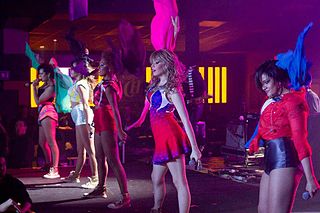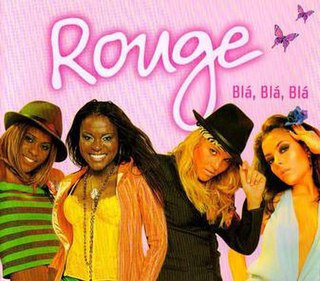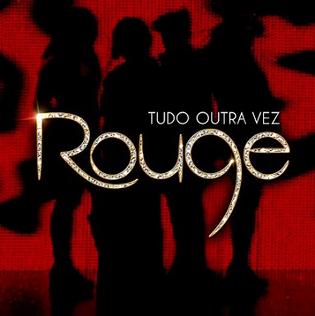
"Algo Tienes" is a song recorded by Mexican recording artist Paulina Rubio for her seventh album, Pau-Latina (2004). It was written and produced by Chris Rodríguez with additional writing by Manny Benito. The song was released as the album's second single on May 19, 2004, by Universal Latino.

Girls were a Brazilian girl group of pop music formed in 2013 through the program Fábrica de Estrelas, transmitted by the network-TV Multishow. The group is composed of Ani Monjardim, Bruna Rocha, Caroline Ferreira, Jennifer Nascimento and Natascha Piva. The group's first album, the homônio Girls, was released on September 3 by Sony Music, bringing the participation of Negra Li, Mika Borges, Aggro Santos and Suave, besides compositions of integral NX Zero, Gee Rocha and Di Ferrero. The first single, "Acenda a Luz", was released on August 8, and the disc also removed two promotional singles, "Monkey See Monkey Do" and "Shake Shake".

Blá Blá Blá is the third studio album released by Brazilian girl group Rouge on June 16, 2004 by Columbia Records. The album is the first of the group like quartet, marking the absence of member Luciana Andrade. In this work, the Rouge bet in a more aggressive and mature pop, being considered the preferred album among the members. After having few to no writing credits on their previous two studio albums, in Blá Blá Blá brings the four members of the group writing two songs in partnership with Milton Guedes and Rick Bonadio, and Fantine and Karin have written a song by themselves; the repertoire also brings Bonadio's original compositions, alone or together with Fúlvio Márcio, Clio, Beto Paciello and Guedes. The album features versions of three songs previously released by other artists, plus four songs composed in English and the group's record company, Sony Music, brought the group to record with exclusivity.

"Blá Blá Blá" is a song by the Brazilian girl group pop Rouge, and the lead single from her third studio album of the same name. The song was written and produced by Rick Bonadio, and became the girls' first song without the vocals of Luciana Andrade, who left the group in February 2004. It was released by Columbia Records on May 4, 2004.

"Sem Você" is a song by the Brazilian girl group pop Rouge, from their fourth studio album, Blá Blá Blá (2004). The song was written in Spanish by Andrés Constantinidis and Carolina de La Muela, with the title "No Dejo de Sentir", and was translated and produced by Rick Bonadio. The song is a pop rock ballad, which talks about not being able to live without the loved one. The song released on August 2, 2004.

C'est La Vie is the second studio album by Brazilian girl group Rouge. It was first released by Columbia Records on May 4, 2003. The album is the successor to the band's debut album, Rouge (2002), which sold more than two million copies, having as main hit the song "Ragatanga". The album features zouk as the main style in the songs "Brilha La Luna" and "Vem Cair na Zueira", as well as international versions such as "Eu Quero Fugir" and "C'est La Vie".

Mil e Uma Noites is the fourth studio album of Brazilian pop girl group Rouge, released on May 30, 2005, by Sony BMG. The work is a mix of new tracks and a greatest hits compilation, including "Ragatanga", "Brilha La Luna" and "Blá Blá Blá". Previously unreleased songs were "Me Leva Contigo", "Mais Uma Da Lista", "Cidade Triste", "Onde Está O Amor?", "O Amor é Ilusão" and the lead single "Vem Habib ", and a bonus acoustic version of the hit "Um Anjo Veio Me Falar". The album sold more than 50,000 copies in Brazil.

Rouge is the self-titled debut studio album by Brazilian pop girl group Rouge, released on August 19, 2002 by Columbia Records in featuring with Sony BMG. Recorded during the show Popstars with the music production of Rick Bonadio, who signs 9 of the 14 compositions, the album counts on compositions of Milton Guedes, Dudu Falcão, Piska, besides having nine versions of international songs and the participation of trio KLB in one of the tracks. The album mixes hectic songs from pop and dance-pop, in songs that talk about fame, love, domination and the power of dreams.

"Não Dá pra Resistir" is a song by the Brazilian girl group Rouge, released on August 19, 2002 as the debut single from the band's debut studio album, self-titled Rouge (2002). Originally a song in English, titled "Irresistible", written by Kara DioGuardi, Frederik Thomander and Anders Wikstrom, it was adapted to Portuguese by Milton Guedes and produced by Rick Bonadio. The original version of the song was later sung by Nikki Cleary and released on her self-titled album, a year after the adapted song released in Brazil.

"Brilha la Luna" is a song by the Brazilian pop girl group Rouge, from their second studio album C'est La Vie (2003). The song was released by Columbia Records as the album's lead single on May 6, 2003. It was written and produced by Rick Bonadio, being a mix of dance-pop and zouk that is heavily influenced by Latin music. "Brilha la Luna" has verses in Spanish, and in many cases, Portuñol. The membrer Luciana Andrade sings lead on the verses and bridge with the other members singing only the high harmony on the pre-chorus and second chorus. After Andrade's departure the group, the verses sung by Luciana were sung by Karin Hils and Fantine Thó, respectively.

"Vem Cair na Zueira" is a song by the Brazilian girl group pop Rouge, from their second studio album, C'est La Vie (2003). The song was written and produced by Rick Bonadio, and brings again the dance-pop and zouk with Latin elements in their sonority. The song talks about living in peace, having fun, without thinking of anything. In the middle of the song, Aline does a rap.

"Tudo é Rouge" is a song by the Brazilian girl group Rouge, released as a promotional single on April 15, 2013, the first release in 8 years. The song, composed by members of the group, along with Rick Bonadio, who also produced it, was the fruit of a meeting with the producer for his reality show Fábrica de Estrelas. "Tudo É Rouge" is a pop song, also deriving from dance-pop and EDM.

"Tudo Otra Vez" is a song by the Brazilian girl group Rouge, released as a promotional single on April 22, 2013. The song, composed by members of the group, Fantine Thó and Karin Hils, and produced by Rick Bonadio, was the result of a meeting with the producer for his reality show Fábrica de Estrelas, from which also was born "Tudo É Rouge".

The Turnê 15 anos is the headlining concert tour by Brazilian girl group Rouge, in celebration to the fifteen years of existence of the group, supporting all four releases: Rouge (2002), C'est La Vie (2003), Blá Blá Blá (2004) and Mil e Uma Noites (2005). It began on January 27, 2018, in Fortaleza, Ceará and concluded on August 11, 2018, in Recife, Pernambuco.

Fantine Rodrigues Thó is a Brazilian singer, songwriter, dancer and instructor. In 2002, she won the talent show Popstars and joined the Brazilian girl group Rouge until 2005, with which she released four studio albums, Rouge (2002), C'est La Vie (2003), Blá Blá Blá (2004) and Mil e Uma Noites (2005), selling in all 6 million copies and becoming the most successful girl group of Brazil and one of the twenty that more sold in the world. In 2006 formed the progressive rock band Banda Thó with his brother Jonathan and some friends, which did not give continuity at the end of the following year, when married and moved to Netherlands.

Bailando (transl. Dancing) is a song by the Brazilian girl group Rouge, released as the group's first return single on February 4, 2018, and is distributed by Sony Music. The song was recorded on the night of the 13th at dawn on November 14, 2017, and was composed and produced by Umberto Tavares and Jefferson Junior, with additions in the composition of the member Fantine Thó. "Bailando" is the first single from Rouge since 2005 and the first with its original line up since 2003.

Karin Pereira de Souza is a Brazilian actress, singer and songwriter. In 2002, she won the talent show Popstars and joined the Brazilian girl group Rouge until 2005, with which she released four studio albums, Rouge (2002), C'est La Vie (2003), Blá Blá Blá (2004) and Mil e Uma Noites (2005), selling in all 6 million copies and becoming the most successful girl group of Brazil and one of the twenty that more sold in the world.

Aline Wirley da Silva is a Brazilian actress and singer-songwriter. In 2002, she won the talent show Popstars and joined the Brazilian girl group Rouge until 2005, with which she released four studio albums, Rouge (2002), C'est La Vie (2003), Blá Blá Blá (2004) and Mil e Uma Noites (2005), selling in all 6 million copies and becoming the most successful girl group in Brazil and one of the twenty girl groups that have sold the most records in the world.

Patricia Lissa Kashiwaba Martins is a Brazilian singer, songwriter, and actress. In 2002, she won the talent show Popstars and joined the Brazilian girl group Rouge. She remained with the group until 2005, during which time they released four studio albums, Rouge (2002), C'est La Vie (2003), Blá Blá Blá (2004), and Mil e Uma Noites (2005), collectively selling 6 million copies. This made the group one of the most successful in Brazil, and one of the twenty best-selling girl groups in the world.

Rouge was a Brazilian pop girl group formed in 2002, through the SBT and Disney Channel talent show Popstars produced by RGB. The group comprised singers Aline Wirley, Fantine Thó, Karin Hils, Li Martins and Lu Andrade.






















